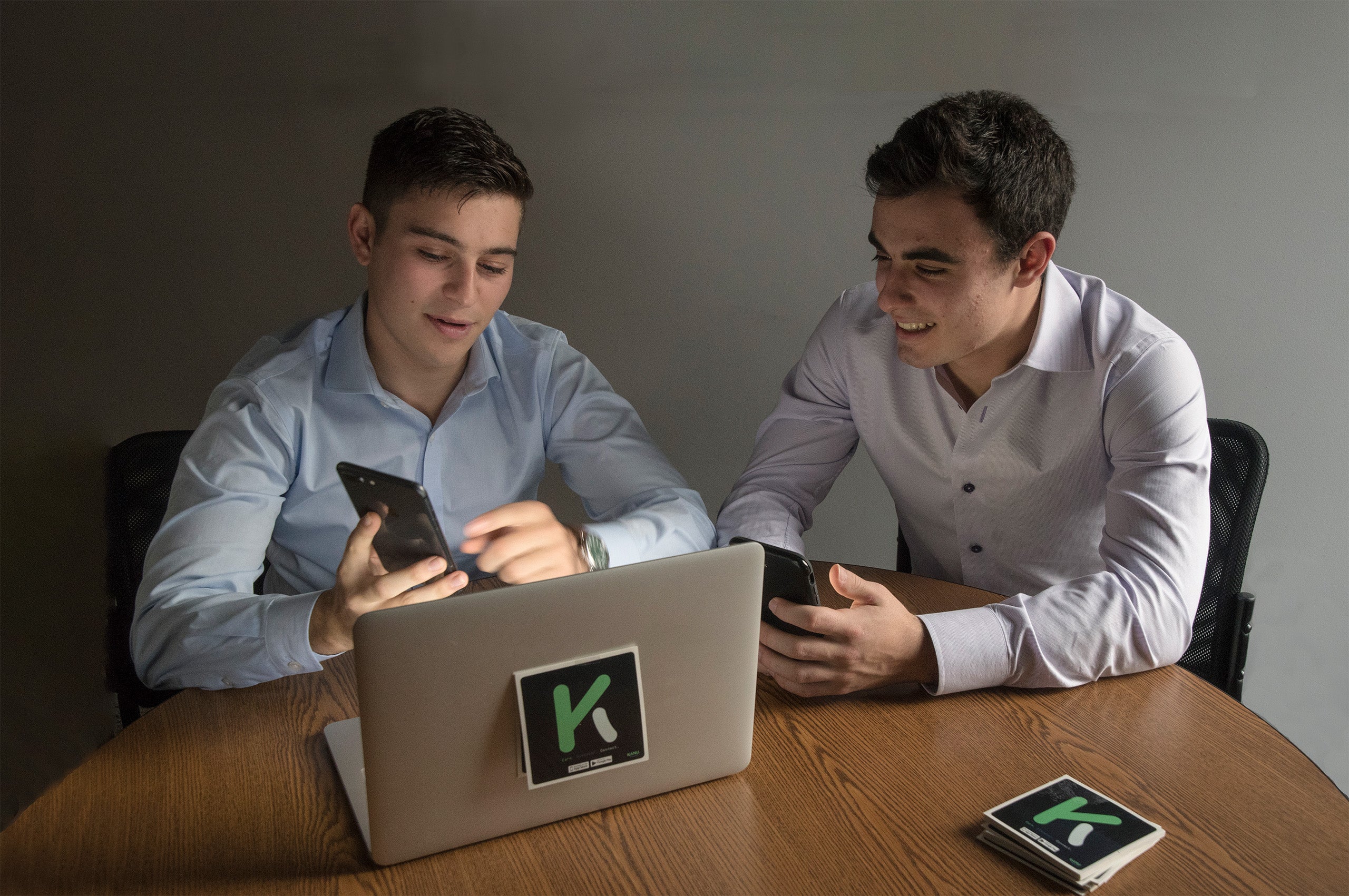
It was 2019, pre-pandemic, and Professor Nancy Forster-Holt was listening to then-business undergraduates Ben Grossman and Andrew Bikash explain the benefits of an app they’d developed called KANU. What she heard was exciting.
The app, KANU (pronounced “can you”), is a peer-to-peer campus marketplace that allows students to set up a business, or side hustle, and provide services or goods to the campus community. Selling a ride? Guitar lessons? A bottle of water? KANU makes the process easy. A winning idea in and of itself, KANU was also a lesson for students interested in the idea of launching their own business.
“The first time Ben and Andrew described the app to me, I was like, ‘My gosh, can students launch side hustles?’” said Forster-Holt. “That’s exactly what the app is for. Anyone in the domain can launch a business, or side hustle. I was so tired of the hypothetical business idea. When they explained the app, I said, ‘You nailed it.’”
For Forster-Holt, the app provided a real-world lesson that had been lacking in her Introduction to Innovation and Entrepreneurship class. In fall of 2019, she added the student side hustle to the classroom, using the Chris Guillebeau book “Side Hustle: From Idea to Income in 27 Days.” At the same time, she started using KANU, adding an experiential lesson that is a game-changer.
National recognition
The combination of Forster-Holt’s student side hustle exercise and KANU has been a winning marriage. Grossman and Bikash beta launched KANU in 2019 as a peer-to-peer campus marketplace and won the Rhode Island Innovation “On Fire Award” in 2020.
In January 2022, the United States Association for Small Business and Entrepreneurship (USASBE) awarded the experiential learning exercise first place in the Entrepreneurship Experiential Education competition at the organization’s annual conference. Along with Forster-Holt, Grossman and Bikash, participants from Drexel University and Florida Gulf Coast University, who adopted KANU at their schools, shared in the honors.
“It’s dynamite that this is executable at other universities,” said Forster-Holt. “We showed that Drexel and Florida Gulf Coast are using it in pretty different ways. It shows the versatility of it.”
For Grossman and Bikash, the award validates KANU and its effectiveness as an educational tool.
Empowering students
“KANU is a safe, virtual marketplace that empowers students to develop and launch venture ideas on campus, earn money, and gain entrepreneurial experience,” said Bikash. “It has helped universities inspire, educate, and engage their students in the classroom, the venture lab, and with the community at large.”
“The award recognizes the unique applications by each professor using KANU,” added Grossman. “As a result of our partnership with educators, we help facilitate venture creation in the classroom, introducing students to the challenges of start-ups by creating side hustles that support the community.”
More than 800 students launched businesses using KANU at URI, Drexel, and Florida Gulf Coast this past fall. At URI alone, students filled three segments of the College of Business100-level Introduction to Innovation and Entrepreneurship class, along with four sections of a 200-level marketing class run by Professor Scott Asadorian.
Traditionally, Forster-Holt said, her classroom exercises on launching a business were hypothetical, stopping at the “precipice of launch.” For their final project, students would describe a good or service that solved a problem on campus and that they could turn into a business. Now students are creating their own ventures. “That’s pretty cool,” said Forster-Holt.
Forster-Holt said the app, which is geo-fenced for each campus and requires that campus email domain, makes it easy for students to set up their own businesses. During the semester, students complete exercises to build out their businesses, earning “badges” for such accomplishments as setting up their storefront, getting customer reviews, and selling a good or service.
“You can sell as much or as little as you want but you still have that minimum proficiency that you’ve proven you started a side hustle,” she said.
Growing the business
“Employing KANU in the classroom and seeing the impact it had on students’ entrepreneurial motivation, understanding and community engagement, I knew we needed to get this in front of more educators,” said Grossman. “We have presented at USASBE the past three years and have received interest from universities and colleges across the nation. That’s why we developed an interactive dashboard that allows educators to plug into the KANU campus marketplace and activate classroom learning.”
The pair also go into the classroom at URI and the other universities that have adopted KANU, telling their stories as entrepreneurs and how they developed the app. They are regular speakers at Innovate@URI’s Launch Lab, which brings together students, faculty and alumni interested in pursuing innovation and entrepreneurship.
“Ben and Andrew have helped so many students launch their side hustles,” said Deedee Chatham, director of entrepreneurship, innovation, and undergraduate research, and director of the Launch Lab. “Their KANU platform is a quick and fun way to test out new business ideas, and it’s great that once these products are launched they are already embedded in the URI campus marketplace.”
Along the way, URI has provided a testing ground for their ideas and the resources and support to succeed, they said. “The community has given us the foundation to really become who we want to be,” Bikash said. “It wasn’t handholding. We had to go seek it ourselves. But once we did, there was always someone able to help and give us what we need.”
Next up, the pair plan to raise capital to scale their operation, expanding it to more aspiring entrepreneurs and attracting more colleges and universities to adopt KANU in and out of the classroom.
“We’ve been building to this for a while. Now that we’re committed to KANU full time, we want to put a year on the books, bootstrapping it, trying to get our sales up,” said Grossman. “But we’re also learning a lot about the product and selling in this space. We continue to be students of the entrepreneurial process, even now that we’re graduates.”
—Tony LaRoche

